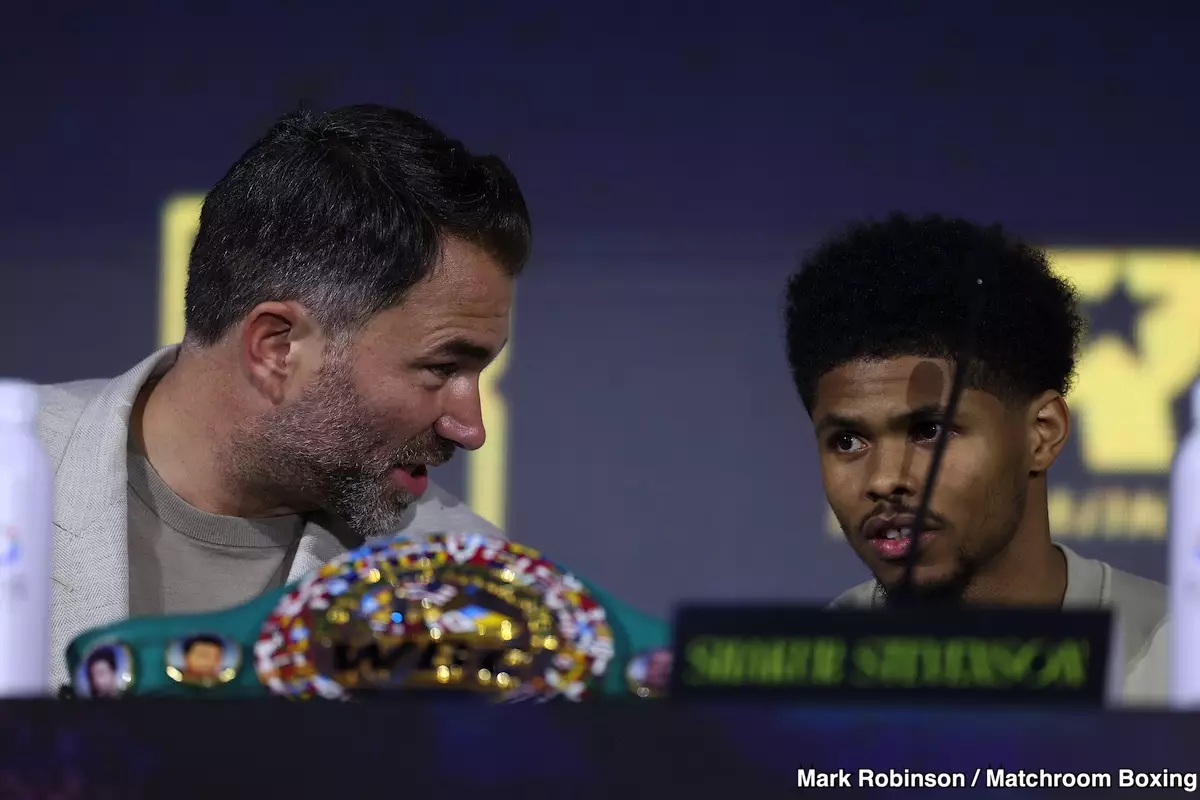In the world of boxing, comparisons to legends often come swiftly and heavily, particularly when potential stars emerge. Recently, promoter Eddie Hearn found himself showering Shakur Stevenson with accolades, likening him to the iconic Sugar Ray Leonard. Scheduled to fight Josh Padley on February 22nd in Riyadh, Stevenson’s burgeoning career is not without its scrutiny, especially when such lofty comparisons are made. While Hearn’s praises aimed to elevate Stevenson’s status, a critical look reveals that the basis for these assertions may need to be more rigorous, opening up a discussion about talent, legacy, and the expectations placed on emerging athletes.
To compare Stevenson to Sugar Ray Leonard invites a debate about talent that transcends mere statistics and titles. Sugar Ray Leonard, one of the all-time greats, was an electrifying fighter whose accomplishments included facing formidable opponents like Roberto Duran and Marvin Hagler during his prime. In contrast, Shakur Stevenson’s resume, while impressive with a record of 22-0 and 10 KOs, lacks the depth to warrant a parallel with Leonard’s storied career.
The crux of this criticism lies not in Stevenson’s capabilities, which are undoubtedly noteworthy, but in how they stack up against a legend’s impact on the sport. Leonard’s fights were not only monumental in their outcomes but also in the excitement they generated. His bouts remained etched in the minds of fans and analysts, whereas Stevenson’s matchups, including his upcoming title defense against Josh Padley, often remain overshadowed and fail to inspire the same fervor.
One of the often-discussed aspects of Stevenson’s career is his struggle to secure high-profile fights, particularly in a competitive weight class like 135 pounds. Critics unleash pointed observations about his frequent need for replacement opponents, reflecting a broader pattern in his career choices. Had Leonard faced similar hurdles, the expectation is he would have swiftly moved up or down in weight rather than remain in one division, as Stevenson appears to do.
The question then arises: if Stevenson embodies the qualities of a future great, why is he not fighting the best available opponents? The fact that he is defending his WBC title against a less illustrious contender like Padley raises eyebrows. It is essential to consider whether these choices hinder Stevenson’s ascent to greatness or whether they are symptomatic of a sport in flux where matchmaking can dilute a champion’s legacy.
Promoter Eddie Hearn’s declaration of Stevenson as “one of the greatest pound-for-pound fighters on the planet” certainly places immense expectation on the young champion. Such labels can motivate or burden an athlete, depending on how they manage pressure. For Stevenson, who is turning 28 soon, the urgency to define his legacy intensifies. While some fans and analysts see glimpses of brilliance in his performances, the reality is that he still carries the daunting task of proving himself against formidable opposition to validate such high praise.
Moreover, Hearn’s comments about Stevenson possibly following in the footsteps of legends like Floyd Mayweather introduce a modern context where the path to greatness may differ significantly from that of past boxers. The sport today is filled with opportunities and distractions, but this evolution may also lead to a diluted notion of what defines a champion.
In essence, Shakur Stevenson stands at a crossroads, and the comparisons to Sugar Ray Leonard provide both a challenge and a platform as he looks to solidify his legacy within the sport. While he embodies potential and already holds the title of a multi-division champion, addressing the perception of “greatness” requires confronting both external expectations and personal ambitions head-on.
Moving forward, the world will be watching as Stevenson takes the ring against Padley. Whether he will rise to the occasion and navigate the varied obstacles of his career is a narrative that continues to unfold. Hearn’s praise may serve as a valuable motivator, but for Stevenson, the proving ground lies not in comparisons with legends but in crafting his own legacy, one fight at a time.


Leave a Reply